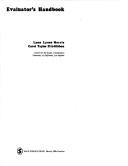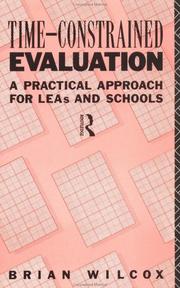| Listing 1 - 10 of 311 | << page >> |
Sort by
|
Book
ISBN: 1317477855 1315706776 1317477863 1283006529 9786613006523 0765627329 9780765627322 9781315706771 9781317477860 9781283006521 6613006521 9780765623836 0765623838 9780765623843 Year: 2011 Publisher: Armonk, N.Y. Sharpe
Abstract | Keywords | Export | Availability | Bookmark
 Loading...
Loading...Choose an application
- Reference Manager
- EndNote
- RefWorks (Direct export to RefWorks)
This book offers the most comprehensive consideration of accountability in both government and the contemporary world of governance currently available. Twenty-five leading experts cover varying aspects of the accountability movement and apply them to governments, quasi governments, non-government organizations, governance organizations, and voluntary organizations.
Government accountability. --- Government accountability --- Public administration
Book
Abstract | Keywords | Export | Availability | Bookmark
 Loading...
Loading...Choose an application
- Reference Manager
- EndNote
- RefWorks (Direct export to RefWorks)
Teaching --- Educational accountability --- Educational accountability. --- Addresses, essays, lectures.

ISBN: 0415900913 0415906253 Year: 1990 Publisher: New York (N.Y.) : Routledge,
Abstract | Keywords | Export | Availability | Bookmark
 Loading...
Loading...Choose an application
- Reference Manager
- EndNote
- RefWorks (Direct export to RefWorks)
Educational accountability --- -Accountability in education --- Responsibility --- Educational indicators --- Educational productivity --- -Educational accountability --- Teaching
Multi
ISBN: 9789280812053 9781919895376 Year: 2012 Publisher: Tokyo United Nations University Press
Abstract | Keywords | Export | Availability | Bookmark
 Loading...
Loading...Choose an application
- Reference Manager
- EndNote
- RefWorks (Direct export to RefWorks)
Government --- Africa --- Government accountability --- Politics and government
Book
ISBN: 9780691129952 9780691162126 0691129959 0691162123 1282964534 1400836816 9786612964534 9781282964532 9781400836819 Year: 2011 Publisher: Princeton, N.J. : Princeton University Press,
Abstract | Keywords | Export | Availability | Bookmark
 Loading...
Loading...Choose an application
- Reference Manager
- EndNote
- RefWorks (Direct export to RefWorks)
The blame game, with its finger-pointing and mutual buck-passing, is a familiar feature of politics and organizational life, and blame avoidance pervades government and public organizations at every level. Political and bureaucratic blame games and blame avoidance are more often condemned than analyzed. In The Blame Game, Christopher Hood takes a different approach by showing how blame avoidance shapes the workings of government and public services. Arguing that the blaming phenomenon is not all bad, Hood demonstrates that it can actually help to pin down responsibility, and he examines different kinds of blame avoidance, both positive and negative. Hood traces how the main forms of blame avoidance manifest themselves in presentational and "spin" activity, the architecture of organizations, and the shaping of standard operating routines. He analyzes the scope and limits of blame avoidance, and he considers how it plays out in old and new areas, such as those offered by the digital age of websites and e-mail. Hood assesses the effects of this behavior, from high-level problems of democratic accountability trails going cold to the frustrations of dealing with organizations whose procedures seem to ensure that no one is responsible for anything. Delving into the inner workings of complex institutions, The Blame Game proves how a better understanding of blame avoidance can improve the quality of modern governance, management, and organizational design.
Sociology of organization --- Political sociology --- Government accountability --- Blame --- Political aspects --- Accountability in government --- Public administration --- Responsibility --- Criticism, Personal --- Blame - Political aspects --- Government accountability. --- Political aspects.

ISBN: 0803910711 9780803910713 Year: 1985 Volume: 1 Publisher: Beverly Hills (Calif.) : Sage,
Abstract | Keywords | Export | Availability | Bookmark
 Loading...
Loading...Choose an application
- Reference Manager
- EndNote
- RefWorks (Direct export to RefWorks)
Book
ISBN: 9781786434623 1786434628 9781786434630 Year: 2017 Publisher: Cheltenham Edward Elgar Publishing
Abstract | Keywords | Export | Availability | Bookmark
 Loading...
Loading...Choose an application
- Reference Manager
- EndNote
- RefWorks (Direct export to RefWorks)
European law --- Effectiveness and validity of law --- Government accountability. --- Government accountability --- Law enforcement. --- Judicial process --- Law enforcement --- European Union countries.
Book
ISBN: 9781350139053 9781350139046 9781350139060 9781350139077 1350139068 1350139041 Year: 2020 Publisher: New York: Bloomsbury academic,
Abstract | Keywords | Export | Availability | Bookmark
 Loading...
Loading...Choose an application
- Reference Manager
- EndNote
- RefWorks (Direct export to RefWorks)
Arguing that we only have democracy when systems of power are held to account, Kaufman examines the real work being done to challenge the operations of power that underlie four unruly social problems : climate change, sweatshop labour, police abuse, and economic deprivation. In Accountability Democracy, Kaufman pairs each of these issues with an operation of power -- the large scale influence of multinational corporations; the power of governments; the authority of financial markets; and the control inherent in systems of meaning -- and using case studies like the Rana Plaza disaster in Bangladesh and the killing of Eric Garner, forcefully demonstrates the difficulty in challenging this nexus of power. Yet, advancing a positive message, Kaufman maintains that this network is not omnipotent and can be questioned if we develop 'mechanisms of accountability' which allow us to conceptualise the nature of these restrictions and the action required to resist them. Kaufman provides then, a model for ethical living that allows us to investigate and appreciate our own connection to the powerful forces that control our world.
Power (Social sciences) --- Government accountability --- Democracy --- POWER (SOCIAL SCIENCES) --- GOVERNMENT ACCOUNTABILITY --- DEMOCRACY --- Political philosophy. Social philosophy --- Political systems

ISBN: 1134913893 128040812X 9786610408122 0203135091 9780203135099 6610408122 0415069688 0415069696 9781134913893 9781134913848 1134913842 9781134913886 1134913885 9781138466197 1138466190 9780415069694 0415069696 9780415069687 Year: 1992 Publisher: London Routledge
Abstract | Keywords | Export | Availability | Bookmark
 Loading...
Loading...Choose an application
- Reference Manager
- EndNote
- RefWorks (Direct export to RefWorks)
Evaluation, whether in schools and colleges, LEAs or TECs is now universally recognised as an essential part of any effective educational and training system. There are, however, two major problems in its implementation: lack of time and a perceived lack among middle and senior managers of the special skills necessary for an evaluation to have external validity. This book provides a solution to both problems. It offers evaluation processes which accept time limitations and work within them an it strips away the mystique of evaluation to describe methods and procedures which will enable edu
Education. --- Educational accountability--Great Britain. --- Education--Great Britain--Evaluation. --- Great Britain. --- Didactic evaluation --- Education --- Educational accountability --- Evaluation.
Book
ISBN: 9780765623836 9780765623843 Year: 2011 Publisher: Armonk Sharpe
Abstract | Keywords | Export | Availability | Bookmark
 Loading...
Loading...Choose an application
- Reference Manager
- EndNote
- RefWorks (Direct export to RefWorks)
| Listing 1 - 10 of 311 | << page >> |
Sort by
|

 Search
Search Feedback
Feedback About UniCat
About UniCat  Help
Help News
News